1991 Chevrolet Corvette ZR1, 61K Low Miles, 6 Speed Manual. 6 Speed Manual 2-Doo
1991 Chevrolet Corvette ZR1, 61K Low Miles, 6 Speed Manual. for sale in Local pick-up only
| Condition: |
Used |
| Item location: |
Local pick-up only |
| Make: |
Chevrolet |
| Model: |
Corvette |
| SubModel: |
ZR1, 61K Low Miles, 6 Speed Manual. |
| Type: |
Hatchback |
| Trim: |
Base Hatchback 2-Door |
| Doors: |
2 |
| Year: |
1991 |
| Mileage: |
61,318 |
| VIN: |
1G1YZ23J5M5800125 |
| Color: |
White |
| Engine size: |
5L NA V8 double overhead cam (DOHC) 32V |
| Number of cylinders: |
8 |
| Fuel: |
Gasoline |
| Transmission: |
Manual |
| Transmission speeds: |
6 |
| Drive type: |
RWD |
| Drivetrain: |
RWD |
| Interior color: |
Red |
| Vehicle Title: |
Clear |
| Want to buy? |
Contact seller!
|
Description for Chevrolet Corvette 1991
1991 Chevrolet Corvette *ZR-1* C4, ONLY 60K Miles, Aluminum 5.7L V8 375hp, 6 Speed Manual Transmission, Red Leather Interior! The convertible returned, as did higher performing engines, exemplified by the 375 hp (280 kW) LT5 found in the ZR-1. In early March 1990, the ZR-1 would set a new record for the highest 24 hour-5,000 mile land-speed by going over 175 mph (282 km/h). Though prices rose even as sales declined, the fourth generation Corvette won its own loyal following as one of the United States' most desirable sports cars. During 1986, General Motors acquired Group Lotus, the UK based engineering consulting and performance car manufacturing firm. The Corvette division approached Lotus with the idea of developing the world's fastest production car, to be based on the C4 generation Corvette. With input from GM, Lotus designed a new engine to fit in place of the L98 V8 [citation needed] that was powering the standard C4. The result was what GM dubbed the LT5, an aluminum-block V-8 with the same bore centers as the L98, but with four overhead camshafts, 32 valves. Lotus also designed a unique air management system for the engine to provide a wider power band by shutting off 8 of the 16 intake runners and fuel injectors when the engine was at part-throttle, while still giving the ZR-1 375 hp (280 kW) when at wide open throttle. In addition to the engine, Lotus helped GM design the ZR-1's (which in prototype version was called "King of the Hill"[4]) upgraded braking and steering systems[citation needed], and helped them pick the settings for the standard "FX3" adjustable active ride control that Chevrolet was fitting to the car[citation needed], helping to ensure that the vehicle was more than just a modern-day muscle car with a big engine and no real capability on the track. GM found that the engine required special assembly, and that neither the Corvette plant in Bowling Green, Kentucky nor any of their normal production facilities could handle the workload, so Mercury Marine corporation of Stillwater, Oklahoma was contracted to assemble the engines and ship them to the Corvette factory in Bowling Green where the ZR-1s were being assembled. The vehicle went on sale in 1990 and was available only as a coupe. It was distinguishable from other Corvette coupes by its wider tail section, 11" wide rear wheels and its new convex rear fascia with four square shaped taillights and a CHMSL (center high mounted stop lamp) attached to the top of the hatch glass instead of between the taillights. The ZR-1 displayed stunning ability both in terms of acceleration and handling capabilities, but carried with it an astonishingly high price. MSRP for the (375 hp) ZR-1 in 1990 was $58,995,[5] almost twice the cost of a (250 hp) non-ZR-1,[6] and had ballooned to $66,278 by 1995; some dealers successfully marked units as high as $100,000. Even at base MSRP, this meant that the ZR-1 was competing in the same price bracket as cars like the Porsche 964, making it a hard sell for GM dealers. In 1991, the ZR-1 and base model received updates to body work, interior, and wheels. The rear convex fascia that set the 1990 ZR-1 apart from the base model found its way to all models, making the high-priced ZR-1 even less distinguishable. Further changes were made in 1992, including extra ZR-1 badges on the fenders and the introduction of Acceleration Slip Regulation (ASR) or traction control. For model year 1993, Lotus design modifications were made to the cylinder heads, exhaust system and valvetrain of the LT5, bringing horsepower up from 375 to 405. In addition, a new exhaust gas recirculation system improved emissions control. The model remained nearly unchanged into the 1995 model year, after which the ZR-1 was discontinued as the result of waning interest, development of the LS series engines, cost and the coming of the C5 generation. A total of 6,939 ZR-1s were manufactured over the six-year period. Not until the debut
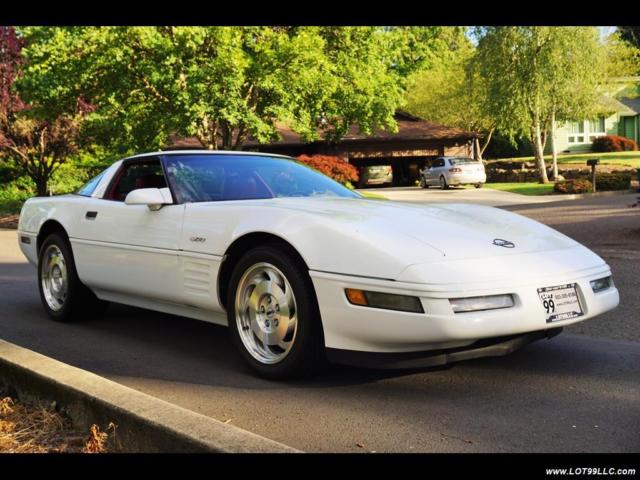

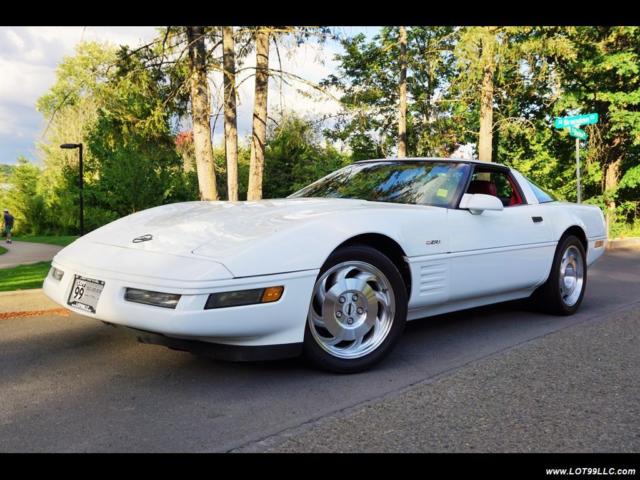

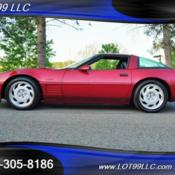 1991 Chevrolet Corvette ZR1 36k Miles 6 Speed 6 Speed Manual 2-Door Hatchback
1991 Chevrolet Corvette ZR1 36k Miles 6 Speed 6 Speed Manual 2-Door Hatchback
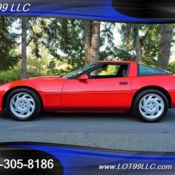 1993 Chevrolet Corvette 6 Speed Manual 70k Miles 6 Speed Manual 2-Door Hatchbac
1993 Chevrolet Corvette 6 Speed Manual 70k Miles 6 Speed Manual 2-Door Hatchbac
 1989 Chevrolet Corvette C4 ** 32K Miles**6 Speed Manual** 6 Speed Manual 2-Door
1989 Chevrolet Corvette C4 ** 32K Miles**6 Speed Manual** 6 Speed Manual 2-Door
 1991 Chevrolet Corvette Coupe 6 Speed Manual Only 47K Miles Black Stunning Car
1991 Chevrolet Corvette Coupe 6 Speed Manual Only 47K Miles Black Stunning Car
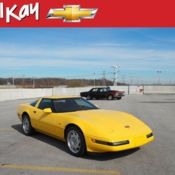 1991 Chevrolet CORVETTE ZR1 37443 Miles Yellow ZR1 2dr Hatchback 6-Speed Manual
1991 Chevrolet CORVETTE ZR1 37443 Miles Yellow ZR1 2dr Hatchback 6-Speed Manual
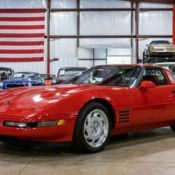 1991 Chevrolet Corvette ZR-1 63456 Miles Torch Red Coupe 5.7L V8 6-Speed Manual
1991 Chevrolet Corvette ZR-1 63456 Miles Torch Red Coupe 5.7L V8 6-Speed Manual
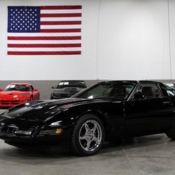 1991 Chevrolet Corvette ZR-1 26759 Miles BLACK Coupe 5.7 Liter V8 6 Speed Manual
1991 Chevrolet Corvette ZR-1 26759 Miles BLACK Coupe 5.7 Liter V8 6 Speed Manual
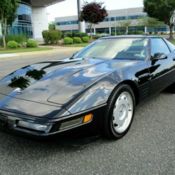 1991 Chevrolet Corvette Coupe 6 Speed Manual Only 47K Miles Black Rare Find
1991 Chevrolet Corvette Coupe 6 Speed Manual Only 47K Miles Black Rare Find
 1991 Chevrolet Corvette 41k!! 6 Speed MANUAL
1991 Chevrolet Corvette 41k!! 6 Speed MANUAL
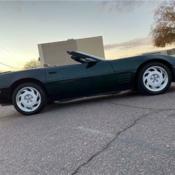 1991 Chevrolet Corvette Convertible 6 Speed Manual 68k mi
1991 Chevrolet Corvette Convertible 6 Speed Manual 68k mi